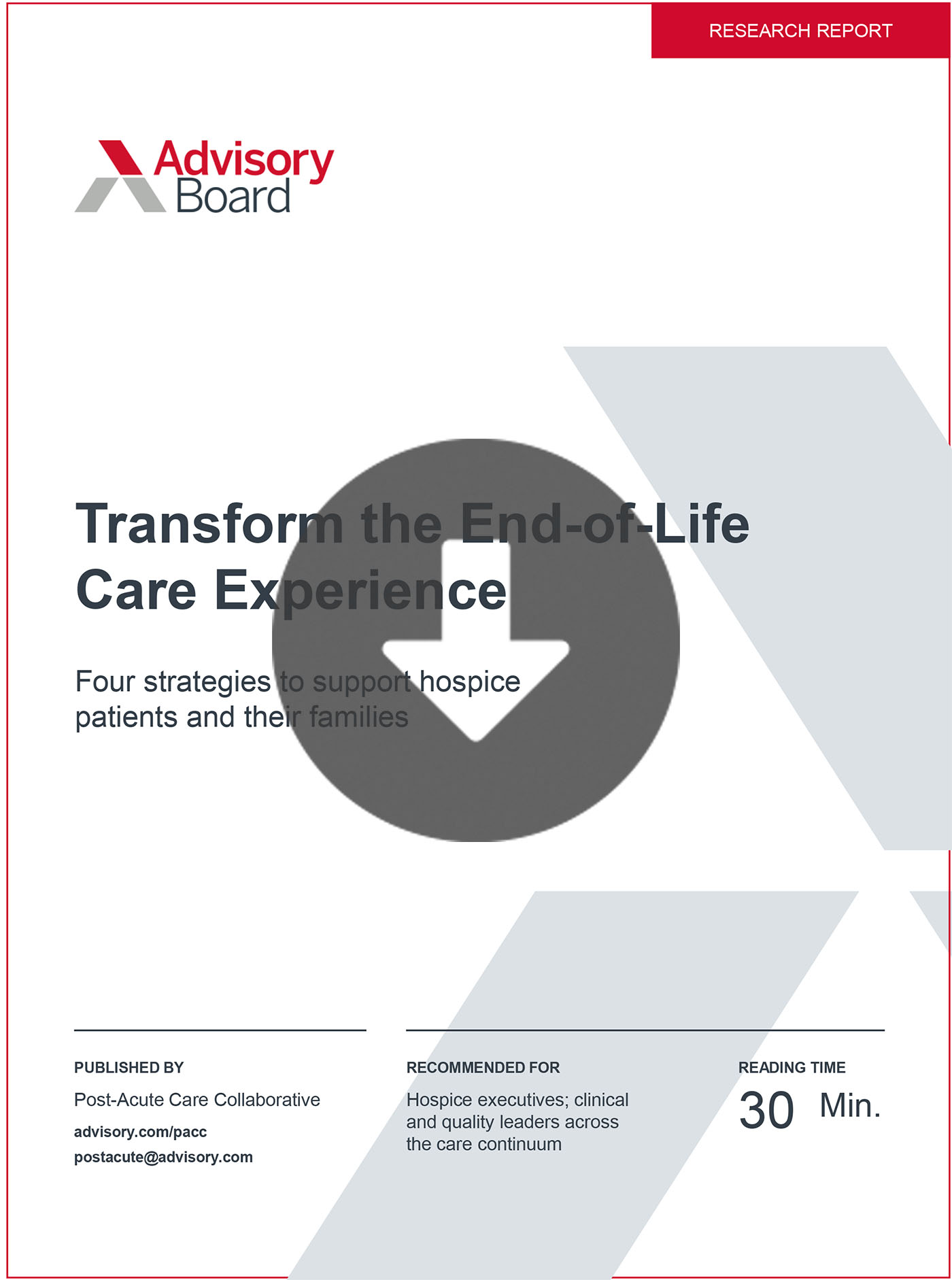Auto logout in seconds.
Continue LogoutEditor's note: This popular story from the Daily Briefing's archives was republished on March 21, 2019.
Asking patients about their bucket list—the things they'd like to accomplish before dying—can serve as an effective, compassionate way to initiate conversations about end-of-life care, according to a study published in the Journal of Palliative Medicine.
Download URMC's question prompt list to start improving end-of-life care for patients
For the study, researchers from the Stanford University School of Medicine administered an online survey to 3,056 individuals throughout the United States.
Almost everyone has a bucket list
The researchers found that 91% of respondents had a bucket list. Older respondents were more likely than younger respondents to have a bucket list.
The six most commonly cited items on respondents' bucket lists included:
- Traveling, included in 79% of respondents' bucket lists;
- Accomplishing a personal goal, included on 78% of respondents' bucket lists;
- Achieving a life milestone, included on 51% of respondents' bucket lists;
- Attaining financial stability, included on 24% of respondents' bucket lists;
- Spending quality time with friends and family, included on 16.7% of respondents' bucket lists; and
- Doing a daring activity, included on 15% of respondents' bucket lists.
According to the researchers, spending quality time with loved ones was particularly common among participants older than age 63, while doing "crazy things"—such as skydiving—was more common among respondents younger than 26.
Reframing the end-of-life care discussion
Previous research shows that doctor-patient discussions about end-of-life care goals can be key to care planning—but initiating such conversations can be difficult and off putting. Reframing the conversation around bucket lists, however, can serve as a good way to open up these conversations, according to VJ Periyakoil, an author of the study and a clinical associate professor of medicine at Stanford.
"When you just Google the term 'bucket list,' it's huge how much interest there is in this," Periyakoil said, noting that the study found nearly 84 million Google search results for "bucket list"—compared with just 4.5 million for "advance directives." The bucket list framing, she added, "provides a very nice framework for thinking about your life goals, health, and your mortality."
How the bucket list conversation can improve care
According to Periyakoil, the bucket list approach helps encourage healthy behaviors. For instance, according to Periyakoil, telling a patient that he likely wouldn't be able to accomplish his bucket list goal of running a half-marathon unless he stopped smoking resonated more than the common refrain of "smoking is bad for you."
More importantly, talking about bucket lists helps patients avoid medical interventions that would subvert their goals, Periyakoil explained, as doctors who are unaware of their patients' goals and desires "will recommend treatments … in a vacuum." These treatments might interfere with life goals, and patients might go along with such treatment without realizing how it will affect their life.
However, when patients share their bucket lists with their providers, they can tailor care to their overall goals. For instance, when a patient with gallbladder cancer told Periyakoil he wanted to travel to Hawaii, she told him he could take the trip while he still could and begin treatment—which would be debilitating—immediately upon his return. The patient took the trip and came back "beaming," according to Periyakoil (Periyakoil, "Well," New York Times, 2/8; Allen, ABC News, 2/8; Stanford release, 2/8).
Next, get URMC's end-of-life conversation prompts
When it comes to end-of-life care, most organizations struggle to meet patients' needs. In a recent poll, 87% of Americans age 65 and older said that they believe their doctor should discuss end-of-life issues with their patients; however, only 27% of those polled had actually discussed these issues with their doctor.
Download URMC's conversation prompts to start improving end-of-life care for patients.
Don't miss out on the latest Advisory Board insights
Create your free account to access 1 resource, including the latest research and webinars.
Want access without creating an account?
You have 1 free members-only resource remaining this month.
1 free members-only resources remaining
1 free members-only resources remaining
You've reached your limit of free insights
Become a member to access all of Advisory Board's resources, events, and experts
Never miss out on the latest innovative health care content tailored to you.
Benefits include:
You've reached your limit of free insights
Become a member to access all of Advisory Board's resources, events, and experts
Never miss out on the latest innovative health care content tailored to you.
Benefits include:
This content is available through your Curated Research partnership with Advisory Board. Click on ‘view this resource’ to read the full piece
Email ask@advisory.com to learn more
Click on ‘Become a Member’ to learn about the benefits of a Full-Access partnership with Advisory Board
Never miss out on the latest innovative health care content tailored to you.
Benefits Include:
This is for members only. Learn more.
Click on ‘Become a Member’ to learn about the benefits of a Full-Access partnership with Advisory Board
Never miss out on the latest innovative health care content tailored to you.

